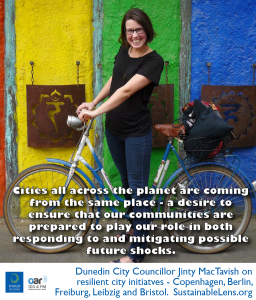Cities all across the planet are coming from the same place – a desire to ensure that our communities are prepared to play our role in both responding to and mitigating possible future shocks.
Jinty MacTavish is a Dunedin City Councillor. She recently returned from presenting a Council initiative at ICLEI resilient cities in Bonn, and took the opportunity to visit several inspiring developments across Europe.
This is a wide ranging conversation, with many highlights, including:
Copenhagen said ‘we need to have a Climate Change adaptation strategy that prepares us for these big rainfall events that we’ll be getting on a more regular basis, how do we do that instead of just putting in more pipes and more channels and more grey infrastructure, how do we do that in a way that promotes other outcomes – that promotes biodiversity, promotes our city’s livability, the needs we have around recreational space, avenues for active transport. With that overlay, as soon as you start to see things in that way…their entire climate change adaptation programme is based around expanding green space and enhancing water retention capacity in their blue space.
The Copenhagen approach is to say “we don’t want this climate change adaption to be a negative, we want it to work for us in terms of improving livability”.
Freiburg has seen 30 years of unflinching investment in integrated transport hub with a focus on active and public transport.
I get frustrated with the speed of change, we can’t move the discussion on fast enough, part of that is that we are hindered by finances, we can’t do things fast enough and comprehensively enough that we can’t prove it works, we do these bits…people say it’s not connected…now we’re focussing on a complete network
Local currency has transformed the visitor experience in that community.
You really get a sense of what an empowered community can achieve when you visit Bristol – there’s not a street that doesn’t have some form of community enterprise on it

